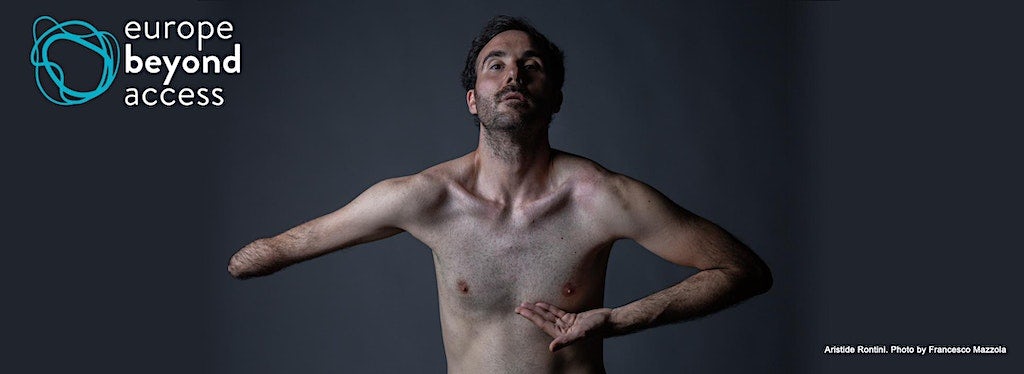europe beyond access: performing arts & disability in Europe

Europe Beyond Access is run by a consortium of seven partners in Europe. In addition to the many activities, new works, and artistic exchanges of the project, Europe Beyond Access has become a key interlocutor in European cultural discourse – at both a national and transnational level. The project has led to the first national Arts & Disability conference in Italy. Flanders Arts Institute is a potential dissemination partner of this project. In May they organise a conference online and in Brussels.
Programme
24 May 10:30-12:30 CEST : ONLINE
Time To Act: Two Years On – Data-led insights on Performing Arts & Disability in Europe
Two years on from the ground-breaking Time to Act report, On the Move, the international cultural mobility network, has conducted follow-up research that reveals data-led insights into the accessibility, inclusion, international mobility and professional development of disabled artists in the European performing arts sector. The report combines a regional focus, covering all the countries participating in the EU’s Creative Europe programme, with more detailed analyses of the progress made in three of the countries where Europe Beyond Access has operated – namely, Italy, Poland, and Sweden.
In this live online event the researchers will share progress made over the past few years, and policymakers and disabled arts professionals will share their responses to the report – including Head of Creative Europe at the European Commission, Judith Videcoq, and artists Filip Pawlak (PL) and Sonja Parmentier (NL)
[Spoken English, International Sign, British Sign Language, Live Captions in English]
26 May 10:00 – 13:00 (Coffee and pastries from 09:30. Networking lunch from 13:00) LES BRIGITTINES, Brussels
Symposium: Disability and Transforming the Cultural Ecosystem
• What is the current cultural landscape for European artists, arts professionals and audiences with disabilities in 2023?
• What recent advances have been made on a national and European basis?
• How can all cultural professionals, arts organisations, national institutions, and cultural policymakers play a part in transforming the cultural ecosystem in the years to come?
These questions and more to be answered through contributions from Mariya Gabriel, European Commissioner for Innovation, Research, Culture, Education and Youth, from European cultural networks, national Arts Councils & Ministries of Culture, and from leading disabled artists including Demy Papathanasiou (GR) and Aristide Rontini (IT).
[Spoken English, International Sign, Live Captions in English]
Europe Beyond Access?
• Europe Beyond Access is run by a consortium of 7 partners: British Council (operating for this project in Poland), Onassis Stegi (Greece), Holland Dance Festival (The Netherlands), Kampnagel (Germany), Per.Art (Serbia), Skånes Dansteater (Sweden), and Oriente Occidente (Italy). The project is supported and amplified by 8 Dissemination Associates IETM, ONDA (France), EUCREA (Germany), Un-Label Performing Arts (Germany), Acesso Cultura (Portugal), Instytut Teatralny im. Zbigniewa Raszewskiego / Theatre Institut (Poland) and ISPA – International Society for the Performing Arts.
• In addition to the many activities, new works, and artistic exchanges of the project, Europe Beyond Access has become a key interlocutor in European cultural discourse – at both a national and transnational level. The project has led to the first national Arts & Disability conference in Italy (in partnership with the Ministry of Culture), the first national Arts & Disability conference in Poland (in partnership with the Polish Ministry of Culture and National Heritage), the launch of the Dutch “Inclusive Agenda for the Performing Arts” (signed by more than 350 arts organisations), and launched a 50-member network of German disabled and non-disabled arts professionals, amongst other achievements.
• At a European level the consortium launched the European Arts and Disability Cluster representing more than 40 grass-roots companies across more than 20 European countries. In 2020 the cluster issued the following report and recommendations on the new Creative Europe programme: ‘Disabled artists in the mainstream: a new cultural agenda for Europe’
• Europe Beyond Access also commissioned a key piece of research – the first of its kind on a transnational scale: ‘Time to Act: How lack of knowledge in the cultural sector creates barriers for disabled artists and audiences’. Spanning 42 countries, Time To Act provides the first transnational evidence that lack of knowledge in the mainstream cultural sector is a key barrier preventing disabled artists and arts professionals participating equally in European culture.


